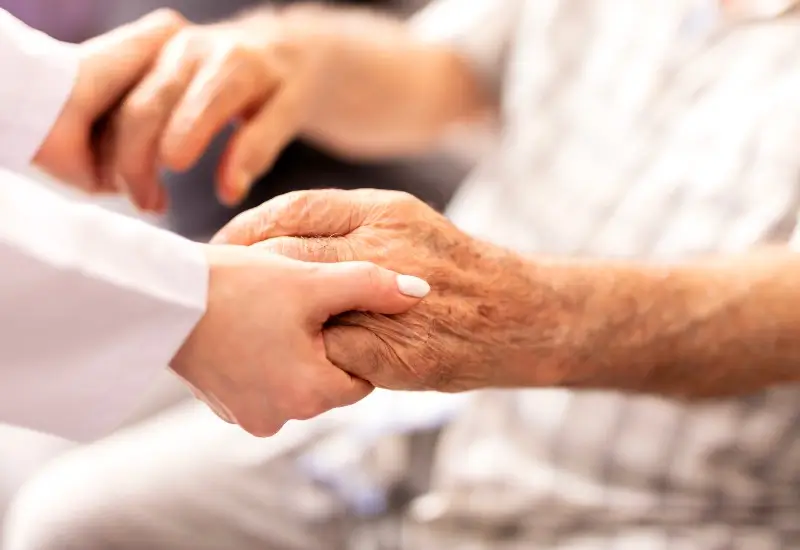Hospice After Stroke
Hospice After a Stroke: Eligibility and Support for Families
Most of us are well aware of the dangers of a stroke. Awareness initiatives and helpful acronyms like FAST are mainstream and have spread crucial information about stroke prevention. However, many people don’t know as much about what happens when a stroke leads to the need for end-of-life care. At Agape Hospice & Palliative Care, we’re committed to helping families in Los Angeles and Orange Counties understand the basics of hospice after a stroke. Here’s what you need to know to best care for a loved one in this situation.

Does Having a Stroke Make Someone Eligible for Hospice?
Whether a stroke makes someone eligible for hospice care depends on several factors. It largely depends on the severity of the stroke and the likelihood of recovery. Hospice is designed for individuals who have a life expectancy of six months or less, and while many stroke survivors recover to varying degrees, others may benefit most from hospice care. Your loved one’s healthcare team can help you better understand their condition and whether hospice is the best option.
Eligibility for Hospice Care After a Stroke
Having a stroke doesn’t immediately qualify someone for hospice, so it’s important to think about the stroke hospice criteria before contacting care providers. Your loved one’s physician will be your guide during this time. Usually, they consider these medical issues when deciding if a patient is eligible for hospice:
- Severe Neurological Problems—If your loved one has a significant cognitive or physical impairment as a result of a stroke with little likelihood for improvement, hospice may be an option. In the same way, a persistent vegetative state could indicate the need for this type of care.
- Difficulty Swallowing—Problems with swallowing, or dysphagia, are common after a stroke and may lead to malnutrition, dehydration, or aspiration pneumonia. These complications can be a sign of a rapidly declining health condition and often qualify the patient for hospice.
- Declining Physical Function—People who can no longer perform the basic activities of daily living, such as bathing, dressing, or feeding themselves, might meet the eligibility criteria for hospice care after a stroke. Frequent hospitalizations are often a sign of functional decline.
- Rapid Weight Loss—Unintentional weight loss or poor appetite may indicate the body’s inability to sustain itself and highlight the need for in-home hospice care.
What Is Hospice Care for Stroke Patients?
When a stroke patient enters hospice, the focus shifts from curative treatments to enhancing their comfort, managing symptoms, and improving their quality of life in the time they have left. Hospice also offers vital emotional and practical support to family members and caregivers. Here’s what you can expect from hospice after a stroke:
- Symptom and Pain Management—The team at Agape is skilled in managing common symptoms, such as pain, muscle stiffness, breathing difficulties, and infections. We may use medications, physical therapies, and palliative techniques to minimize discomfort.
- Nutrition Assistance—For stroke patients who struggle with swallowing or poor appetite, we offer alternative ways to ensure they remain as comfortable as possible. These could include modified diets, feeding assistance, or artificial nutrition and hydration.
- Comfort—We offer in-home hospice care, so if your loved one lives at home, there’s no reason to move into a facility. Our team will provide any necessary medical equipment.
- Mobility Assistance—While hospice care isn’t aimed at rehabilitation, gentle physical therapy may reduce pain or improve comfort.
- Emotional Support—A stroke can take a toll on your loved one’s mental health, leading to anxiety or depression. With the help of our hospice social workers, your loved one can express their feelings and cope with the transition.
- Spiritual Guidance—For those who seek it, our pastoral care services can connect you with spiritual advisors.
- Caregiver Relief—Caring for a loved one after a stroke can be overwhelming. Our team offers family caregivers respite, giving them time to focus on self-care and other responsibilities.
- Bereavement Support—As the end of your loved one’s life nears, you and other family members are welcome to our bereavement support. This service ensures you have a space to process the loss.
Talk to a Hospice Provider Today
Agape Hospice & Palliative Care is here for families in Los Angeles and Orange Counties navigating the aftermath of a stroke. We provide comprehensive hospice care for stroke patients and will work with your loved one’s doctors to create a personalized care plan. You can have peace of mind that your family member is comfortable, even in their final days. Reach out to us today for more information.
